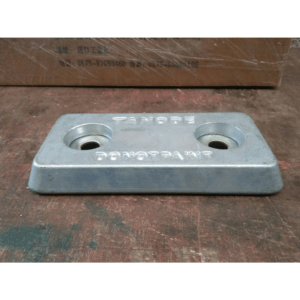Swimming is undoubtedly a fun activity, whether it’s in an indoor or outdoor pool, in saltwater or chlorinated water. A well-maintained swimming pool can provide better entertainment, especially on sunny days. But what measures are typically needed to maintain a swimming pool? How does maintenance differ between saltwater pools and chlorinated systems? Are there differences in repair costs?

The installation cost of a seawater swimming pool system is much higher, but the maintenance cost is significantly lower. This system requires specific steps to ensure the safety and effectiveness of pool equipment. The increase in salt content enhances the conductivity of the water, turning your swimming pool into a giant battery. But don’t worry, it’s still safe.
Just like the impact on car batteries, electrolytic corrosion can cause extensive damage to metal devices in swimming pools, leading to structural and aesthetic issues. Fortunately, several methods can help minimize losses.
What are Zinc Anodes?
Galvanic corrosion is an electrochemical reaction that occurs when metals interact with electrolytes in saltwater. This process ends with the metal returning to its natural state, weakening the metal structure. Zinc anodes are active metals that can prevent the corrosion of less active metals. Because zinc has a more negative electrochemical potential than the materials it protects, the anode itself decomposes instead of the protected metal. From pool ladders to light fixtures, from floating baskets to railings, any metal components of a saltwater pool system are susceptible to damage from electrolytic corrosion. Anodes protect the metal in the pool by attracting the current flowing in the water. Since zinc is a weaker metal than other metals found in saltwater swimming pools, the anode corrodes earlier than the surrounding metals.

Why and When to Use Zinc Anodes?
Even though chlorine is salt-based, traditional chlorinated pools are still susceptible to electrolytic corrosion. However, saltwater pools, with their tenfold salt content compared to traditional chlorine pools, are more susceptible to extensive corrosion damage. Using zinc anodes can prevent corrosion damage to metals. Zinc anodes come in various shapes and sizes. From spherical devices to disc-shaped weights, each model has specific purposes. However, they all provide the same high level of protection. Zinc anodes are relatively easy to install, requiring simple instructions. These devices typically last for three to four years and should be replaced when the anode size reaches 50% of its original size.
Inline Anodes
T-shaped inline anodes attach directly to bonding wire. You can install this anode anywhere in the piping system. While zinc anodes are an effective method for reducing or eliminating electrolytic corrosion, another key process to protect your saltwater pool equipment is equipotential bonding. Equipotential bonding balances the potential between saltwater and metal. This balance stabilizes the pool system, preventing harmful electric shocks. When choosing the best solution for your swimming pool system, I recommend fully utilizing these three methods. Use zinc anodes to combat the effects of electrolytic corrosion and equipotential bonding to stabilize the conductivity of the water.
